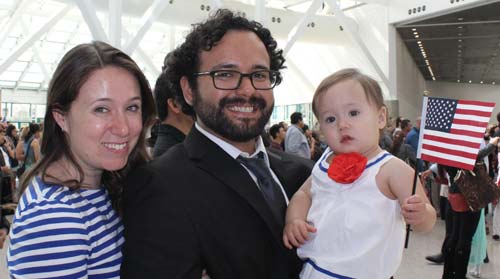TIM, Immigration, David R Fullmer, Attorney At Law
 Immigration Reform is currently one of the hottest topics in the United States. As President Barack Obama renews his call for a comprehensive approach to addressing illegal immigration, politicians, community leaders and constituents at every level are discussing and weighing in on the various components of immigration reform. The debate is taking place not only in the regulatory realm but in the communities and at the grass roots. The recent passage of Arizona’s State Bill 1070 which seeks to identify and punish “illegal immigrants” , the resulting boycotts and law suit by the Department of Justice (DOJ) challenging the constitutionality of the law and seeking to prevent its taking effect on July 29, 2010, have forced the issue into the national debate. At the state, national and local levels, the debate includes very strong opinions and feelings from supporters and opponents on both sides of the issue. The one thing that all can agree upon is that the current immigration system in the U.S. is outdated and in need of reform and we must come up with workable immigration policies to help deal with the economic realities of business needs and the quantity of undocumented workers living and working in the U.S. today. According to a recent Gallup Poll, (July 6, 2010) Americans are closely divided (50% to 45%) over whether the government’s main focus should be on the halting the flow of illegal immigrants coming into the U.S. or on developing a plan to deal with those already here.
Immigration Reform is currently one of the hottest topics in the United States. As President Barack Obama renews his call for a comprehensive approach to addressing illegal immigration, politicians, community leaders and constituents at every level are discussing and weighing in on the various components of immigration reform. The debate is taking place not only in the regulatory realm but in the communities and at the grass roots. The recent passage of Arizona’s State Bill 1070 which seeks to identify and punish “illegal immigrants” , the resulting boycotts and law suit by the Department of Justice (DOJ) challenging the constitutionality of the law and seeking to prevent its taking effect on July 29, 2010, have forced the issue into the national debate. At the state, national and local levels, the debate includes very strong opinions and feelings from supporters and opponents on both sides of the issue. The one thing that all can agree upon is that the current immigration system in the U.S. is outdated and in need of reform and we must come up with workable immigration policies to help deal with the economic realities of business needs and the quantity of undocumented workers living and working in the U.S. today. According to a recent Gallup Poll, (July 6, 2010) Americans are closely divided (50% to 45%) over whether the government’s main focus should be on the halting the flow of illegal immigrants coming into the U.S. or on developing a plan to deal with those already here.
In the meantime, the reality for U.S. businesses, large and small, is that they are regularly placed in the precarious position of trying to follow the law and also remain competitive and solvent in a challenging and ever changing world economy. Since the passage of the 1986 Immigration Reform and Control Act (IRCA), the last major attempt at immigration reform, employers are responsible for ensuring that potential employees are legally authorized to work in the U.S. The burden falls on the employer to determine if the documentation provided is legitimate. This is increasingly more difficult and burdensome for employers based on the noted rise in false documents and identity theft.
In our practice we are regularly approached by employers who are trying to do the right thing, follow the current immigration laws and employment eligibility verification procedures, yet finding themselves in the difficult position of having the burden of determining whether or not an employee is truly authorized to work. The burden is particularly difficult for employers in construction, agricultural, manufacturing, food services or other seasonal businesses. Under the current climate of increased government enforcement, the stated strategy in the fight against illegal immigration has been to crack down on employers who employ illegal workers and to pursue fines and even criminal liability against such employers. Many employers are trying to take all steps available to follow the immigration laws and yet under the current system it is difficult for them to legally staff their businesses.
A typical scenario that we have encountered occurs when an employer is trying to be in compliance and utilizes the government’s E-verify system and processes all new employees through E-Verify. Often with seasonal employees, the employer may be rehiring the same employee each year. However now using E-verify, they discover that many, if not most, of their seasonal employees are not truly eligible to work. The company now finds itself in a difficult position of needing employees to meet the business commitments and not being able to find work-authorized employees. If forced to pay a higher wage to find workers, the company cannot productively meet its contractual obligations and risks its solvency and the jobs of the 100’s of U.S. and work authorized employees on its payrolls. The issues that our clients are facing are not isolated, but rather felt throughout the country. As the pool of U.S. workers continue to age and become more highly educated and skilled, the number of U.S. workers available to fill lower-skilled, entry level positions decreases. This further highlights the need of U.S. Businesses for a legal option to fulfill their labor needs.
It has become abundantly clear that any viable solution to our nation’s immigration problems must begin with a comprehensive approach to reform that addresses all aspects of our immigration system. Immigration reform must simultaneously create legal avenues for skilled and unskilled workers in areas of demand to enter the U.S., allow immigrants who are currently here without work authorization, but who have not committed any crimes, to earn the opportunity to pay fines and become legal, address multi-year backlogs in family and employment-based immigration and create and implement a smart border security and enforcement regime that respects core principals of due process, protects our security needs and does not make the employer the auxiliary police force for the Immigration system.
Piecemeal reforms have been tried in the past and have failed. Laws like Arizona’s SB 1070 do not address the problems we face. The attitude of removing anyone who is “illegal” does not help employer’s with their need to hire laborers. The government’s tough enforcement-focused strategy for the past ten years has not helped to stem the flow of undocumented workers. The 1986 Immigration Reform and Control Act (IRCA) focused only on the symptoms, the undocumented population, not the cause: an immigration system that does not reflect the needs of U.S. businesses. The most positive thing about Arizona SB 1070 is that it has raised the Immigration Reform debate and awareness to the national level. U.S. Businesses need Immigration Reform.
Disclaimer: Nothing on these pages should be taken as legal advise for any individual case or certain situation. The information is general and should not be relied on upon for any specific situation. For legal advice, please contact one of our attorneys at www.usworkvisa.com
All content is copyrighted by IVENER & FULLMER LLP 2008. All rights reserved. No portion of this article may be duplicated without permission. Services relating to immigration and naturalization provided by Ivener & Fullmer LLP are provided by active members of the State Bar of California or by a person under the supervision of active members of the State Bar of California.








